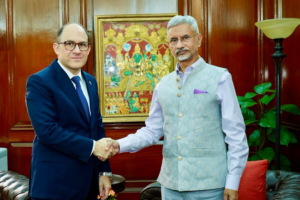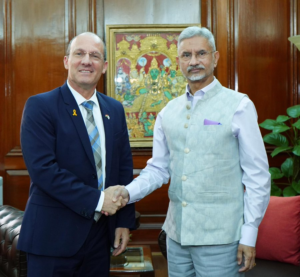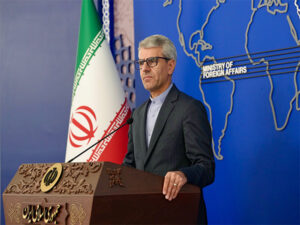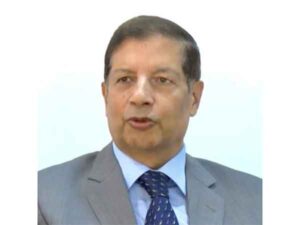UAE leverages oil power to push secretive oil companies on emission reductions: Report
Washington, DC [US], November 11 (ANI): The United Arab Emirates (UAE) is leveraging its status as an oil producer and host of the upcoming United Nations climate talks to prod some of the world’s most secretive state-run oil companies to cut their greenhouse gas emissions, according to documents obtained by POLITICO, a US-based politics-focused news wesbite.
The effort, termed as the Global Decarbonisation Alliance, aims to make a significant impact at the COP28 negotiations starting on November 30 in Dubai. It is expected to be announced as a side deal to the main conference, separate from the diplomatic text addressing climate change.
Environmentalists have criticised the initiative, led by Sultan al-Jaber, head of this year’s climate talks and chief of the UAE’s national oil company. Al-Jaber has suggested using the sector’s resources to clean up petroleum production rather than swiftly transitioning away from fossil fuels, as reported by POLITICO.
The Global Decarbonisation Alliance seeks to engage national oil companies, such as Saudi Aramco and Colombia’s Ecopetrol, in addressing greenhouse gases. These companies account for half of global crude production and sit on 90 per cent of the world’s oil and gas reserves, making their involvement crucial to limiting temperature increases.
Mark Brownstein of the Environmental Defence Fund, involved in discussions on the alliance, said, “Up until this point, I think the [national oil companies] have not been engaged. The COP presidency is definitely leaning into this. It is not yet clear whether the industry will respond.”
The initiative proposes commitments that UAE’s COP28 team is pushing all national oil companies to endorse, including supporting the Paris Climate Agreement’s goals and investing in renewable energy and low-carbon technology. It does not specify targets but requires companies to commit to “near-zero” methane emissions and reduce routine flaring by 2030, according to details of the plan reviewed by POLITICO.
The Global Decarbonisation Alliance would mandate companies to commit to achieving “near-zero” methane emissions and “aim” to reduce routine flaring by 2030. Methane reduction is crucial for its rapid impact on cooling the planet, given its effectiveness in trapping heat compared to carbon dioxide.
Although details might have evolved in ongoing discussions, supporters believe this effort will introduce transparency to national oil company operations, usually pivotal to their countries’ economies. The hope is that public and international pressure will incentivise these companies to adopt environmentally friendly practices, challenging their often protected market positions.
A spokesperson for COP28 confirmed that 20 companies, both national and investor-owned, have already signed up for the pledge.
“The COP28 Presidency has called on all IOCs and NOCs to step up, align around net zero by or before 2050, zero out methane emissions, and eliminate routine flaring before the end of this decade,” the spokesperson said. “This forms part of the COP28 President’s Action Agenda to fast track a just and orderly energy transition and the need to disrupt business-as-usual and decarbonise the energy system of today while we build the low-carbon solutions of tomorrow.”
Critics argue that the alliance lacks stringency, with some major oil and gas companies already having more stringent climate targets. They contend that it duplicates existing frameworks and fails to include emissions from the oil and gas produced and sold, which constitute the majority of the industry’s warming.
“It’s a big gaping hole,” said David Waskow, director of the World Resources Institute’s international climate initiative. “Net-zero in your own operations by 2050 is not terribly remarkable.”
The Global Decarbonisation Alliance has raised scepticism due to being led by the UAE and al-Jaber. Critics claim that al-Jaber, also running Abu Dhabi National Oil Company (ADNOC), cannot impartially oversee the negotiations. Although ADNOC has set goals to eliminate methane emissions by 2030 and achieve net-zero emissions by 2045, it also plans to spend USD 150 billion expanding oil and gas capacity, in a country that already is the world’s seventh-largest producer of those fuels, as reported by POLITICO.
The alliance’s broad parameters call for reducing emissions intensity without absolute emissions targets, potentially allowing overall production to grow. It does not include targets for increasing renewable investment.
The potential alliance of oil producers marks the first time such an effort has been proposed, institutionalising engagement on climate emissions within the industry.
Al-Jaber has aimed to cast his dual role as president of the negotiations and head of ADNOC in a positive light. Presenting himself as a unique advocate for climate action within the conservative realm of national oil companies, he emphasised this perspective at conferences for OPEC and ADIPEC, where Abu Dhabi hosted a meeting of national oil companies last month. Al-Jaber asserted that the reduction of fossil fuel usage is “inevitable” for the world.
Landon Derentz, Senior Director and Morningstar Chair for Global Energy Security at the Atlantic Council, remarked on the potential oil producers’ alliance, stating that it represents the first time such an effort has been proposed. He noted, “The industry hasn’t been engaged structurally in any kind of consistent pattern on addressing climate emissions, and I think that this is institutionalising something that can credibly be returned to on a regular basis,” POLITICO reported.






